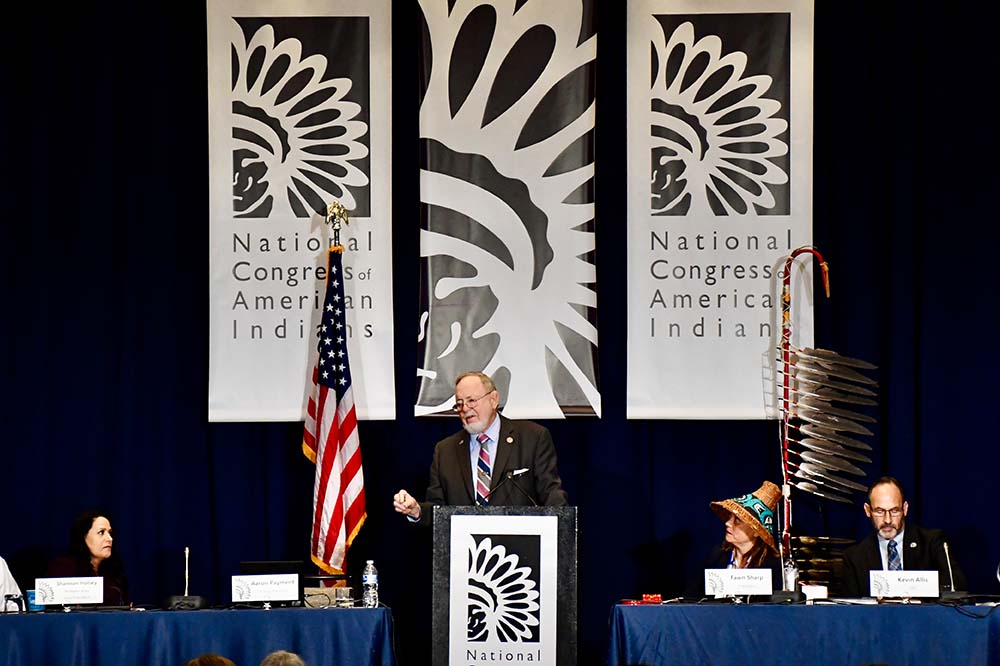
- Details
- By Rob Capriccioso
- Economic Development
WASHINGTON — If House Speaker Nancy Pelosi, D-Calif., is in search of votes to pass the Senate’s bipartisan hard infrastructure bill, she might do well to look to Republicans in the lower chamber who have strong Native American and Alaska Native interests, advocates say.
Alaska Republican and dean of the U.S. House Rep. Don Young is putting out major signals that he could support the $1.2 trillion bill that contains $550 billion in new spending and $11 billion to $15 billion set aside for Natives, depending on whom you ask. (The Senate Committee on Indian Affairs says it contains more than $11 billion for Natives, while the National Congress of American Indians says the number could be as high as $15 billion.)
Want more news like this? Get the free weekly newsletter.
Young’s spokesman Zack Brown tells Tribal Business News that his boss was quite pleased to see the Senate reach a bipartisan agreement on infrastructure and that the congressman continues to carefully review the legislation.
“As (the) ranking member of the Subcommittee for Indigenous Peoples, he is especially interested in the provisions for Native communities in Alaska and across the country,” Brown said. “There are components of the bill he is very heartened to see. Generally speaking, tribal governments are included in grant programs for hard infrastructure, which is especially important for Alaska Native communities that can be far off of road systems.”
Brown noted that the bill provides funding for the Bureau of Indian Affairs’ road maintenance program, for which Congressman Young has long advocated.
“The COVID-19 pandemic shined a light on the lack of broadband access in rural areas, particularly for Native Americans,” Brown added. “The congressman welcomes fixes to federal broadband grant programs, which will help expand high-speed access to Native communities.”
Finally, Brown noted that the bill contains significant funding for water and sanitation infrastructure, which is especially important to Rep. Young following this year’s fire in Tuluksak that destroyed the village’s only source of clean water.
“The congressman has worked on tribal water and sanitation projects this Congress and introduced legislation with Congressman O’Halleran to address this infrastructure,” Brown said. “He is encouraged that following his advocacy, the Senate included funding for water infrastructure.”
Brown said that Rep. Young “will give this bill a fair hearing and looks forward to working on it in the House.”
“As former chairman and most senior member of the Transportation and Infrastructure Committee, he has a large platform to advocate for the unique needs of Alaska Natives and Indigenous people across the country — and it’s a platform he’ll be using,” Brown added.
While conventional wisdom has been that House Republicans might line up against the bill in an effort to make it all the more difficult for Pelosi to wrangle competing progressive and moderate interests in her Democratic caucus, that would not be the case if leaders like Young are able to bring Republican support to the table.
Native advocates note that Young works closely with Republican Alaska Sen. Lisa Murkowski, vice chair of the Senate Committee on Indian Affairs, and she played a major role in securing the American Indian and Alaska Native inclusions in the bill. It passed the Senate on Aug. 10 by a vote of 69-30.
“Congressman Young, being from Alaska, understands more than most the incredible needs and costs of developing infrastructure in Indian Country,” Lael Echo-Hawk, a tribal lawyer with Washington, D.C.-based MThirtySix PLLC, told Tribal Business News. “I am confident in his commitment to ensuring Indian Country benefits from this massive investment.”
While an affirmative vote from Young seems plausible, Natives also often look to Republican Oklahoma Rep. Tom Cole, a citizen of the Chickasaw Nation, when advocating for bipartisanship in the House on bills that aid Indian Country.
Cole’s support is less certain, however, with a spokesperson for the congressman saying that he typically doesn’t make vote statements before legislation is scheduled for consideration and a vote in the House, which is the case here.
Oklahoma Republican Rep. Markwayne Mullin, a Cherokee Nation citizen, is not expected to join Democrats on infrastructure. He has been a partisan on many large bills, Native advocates note, although he has supported some Indian-focused legislation.
Democratic Kansas Rep. Sharice Davids, a citizen of the Ho-Chunk Nation, is another legislator Indians hope can explain the tribal components of the bill to her colleagues.
Davids has not yet indicated whether she is a “yes” vote, saying in a statement that the Senate package “falls short on some of the smart policy provisions” she helped write into the INVEST in America Act.
Yet, she noted that the legislation “does include significant investments in broadband, electric vehicles, and public transit, creating millions of jobs in growing sectors — without raising taxes on the middle class.”
“Since my first meeting with the White House on infrastructure in March, I’ve been clear about what I’m looking for: a bill that creates good-paying jobs, tackles climate change, and sets the foundation for decades of economic growth,” Davids added. “I hope we can continue the bipartisan momentum from the Senate to deliver policy that meets the moment on infrastructure and our economy, and I look forward to reviewing this bill in depth.”
Davids’ spokesperson said that it isn’t known yet when the bill will come up for a vote in the House.
The House is expected to cut its summer recess short, returning to D.C. on Aug. 23 to take up both the bipartisan infrastructure bill and the Democrats-only budget resolution reconciliation package. The initial framework for tribal inclusion in that reconciliation is $20.5 billion.
--
EDITOR’S NOTE: Tribal Business News will have continuing updates about the plan and its effects on Native America as it progresses.